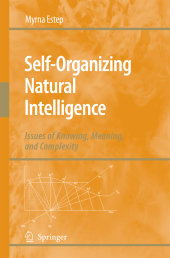 Neuerscheinungen 2014Stand: 2020-02-01 |
Schnellsuche
ISBN/Stichwort/Autor
|
Herderstraße 10
10625 Berlin
Tel.: 030 315 714 16
Fax 030 315 714 14
info@buchspektrum.de |

Myrna Estep
Self-Organizing Natural Intelligence
Issues of Knowing, Meaning, and Complexity
2006. 2014. xxxii, 359 S. 235 mm
Verlag/Jahr: SPRINGER NETHERLANDS; SPRINGER 2014
ISBN: 9400790562 (9400790562)
Neue ISBN: 978-9400790568 (9789400790568)
Preis und Lieferzeit: Bitte klicken
This book brings new scientific methods to intelligence research that is still under the influence of 19th century single causal theory and method. The author describes a rigorous and exhaustive classification of natural intelligence while demonstrating a more adequate scientific and mathematical approach than current statistical and psychometric approaches construct to shore up the out-dated and misused IQ hypothetical. The author demonstrates the superiority of a highly developed multidisciplinary-theory models view of intelligence.
Dedication. Introduction. List of Abbreviations. List of Figures and Tables. Acknowledgements. 1. The Problem of Intelligence. 1.1 Some of the Basic Issues. 1.2. The Faulty Sciences of Intelligence. 1.2.1 The Anti-Theory Bias. 1.2.2 Invalid Reductionism. 1.2.3 Neglect of Emerging Intelligence. 1.2.4 Neglect of Theory Construction and Concept Formation. 1.2.5 Unexamined Assumptions, Concepts, and Fallacies. 1.2.6 A Bankrupt Theory of Knowing in the Sciences of Intelligence. 1.2.7 A Missing Distinction between Rule-governed and Rule-bound Intelligence. 1.2.8 Neglect of Multiple Signs and Disclosure of Intelligence. 1.2.9 Mechanical ´Hard-Wired´ and Natural Intelligence: Absent the Difference. 1.3 Requirements for a New Science of Intelligence. 1.3.1 A Broader Theory of Knowing. 1.3.2 A Broader Theory of Signs of Intelligence. 1.3.3 Methods of Nonlinear Science: The Emergence of Self-Organizing Dynamical Intelligence. 1.4 Summary. 2. The Universe of Intelligence. 2.1 Carving the Problem Space. 2.1.1 Rational Inquiry and Ideology: The Differences. 2.1.2 Careless Carving. 2.2 Classical Origins of Fabric of Intelligence Theory: Cut on Biases. 2.2.1 Plato and Aristotle´s Conflicting Theoretical Stage. 2.2.2 Anthropocentrism, Language, Gender, Race, Size, Wealth, and Place. 2.2.3 The Fabric of Concepts Defining Intelligence Since Darwin. 2.3 Today´s IQ Tests: Circularity, Bias, and American Eugenics. 2.3.1 The Economic Argument. 2.3.2 Reification and the Eugenics Argument. 2.3.3 A Static Hierarchy: g the Controller. 2.3.4 Biological Determinism Revisited. 2.4 Summary. 3. The Genesis of Intelligence: Innate and Emergence Arguments. 3.1 Categorization, Classification, Concepts and Representation. 3.1.1 Reality and the Influence of Representationalism. 3.2 The Continuing Problem with Universais (Concepts): Some History. 3.2.1 Realists, Conceptualists, and Nominalists on Universais. 3.2.2 Theories of Knowledge and the Scope ofIntelligence. 3.2.3 Today´s Representationalist Myths: Cognitive Maps in the Brain. 3.3 The Innate Versus Emergence Arguments. 3.3.1 The Genetically Encoded Syntax Argument. 3.3.2 Nonverbal Communication: Beyond Alphanumeric Symbols and Vocalizations. 3.3.3 Evolutionary Argument against Innatists. 3.3.4 Cognitivism, Mechanism, and ´Innateness´: How the Mind Does Not Work. 3.4 Summary. 4. The Intelligence of Doing: Sensorimotor Domains and Knowing How. 4.1 The Intelligence of Doing. 4.1.1 A Two-Pronged Approach to Intelligence Inquiry. 4.1.2 Cognition, Consciousness, Awareness. 4.2 The Science of Awareness. 4.2.1 Cortical Structures and Information: Neural Bases of Awareness and Intelligent Doing. 4.2.2 How Concepts (Universals) Get Formed: A Global Map Theory. 4.2.3 Primitive Awareness. 4.2.4 Experimental Evidence of Immediate Awareness. 4.2.5 Primitives of the Preattentive Phase of Awareness. 4.3. Primitive Intelligence of Moving and Touching. 4.3.1 Multiple Spaces of the Senses, Images and Probing. 4.3.2 Smoothness and Timing in Intelligent Doing. 4.4 Summary. 5. Universals, Mathematical Thought and Awareness. 5.1 On the Origins and Nature of Mathematical Thought. 5.1.1 A Postmodern View: The Body Shapes Development and Content of Mathematics. 5.1.2 The Language Causal Argument: Language Shapes the Development and Content of Mathematics. 5.1.3 Thinking in Patterns and Images. 5.1.4 The Realism Argument: Reality and Reason Shape the Development and Content of Mathematics. 5.2 Problems with Representation Theories Revisited. 5.2.1 Classification and the Nature of Sui Generis Objects of Immediate Awareness. 5.3 Phenomenal Experience and Mathematics. 5.3.1 Perception and Mathematical Objects. 5.3.2 The Reality of Sets and Concepts. 5.3.3 Intersubjective Requirements of Mathematical Thought. 5.4 Summary. 6. Intelligence as Self-Organizing Emerging Complexity. 6.1 Categories of Natural Intelligence. 6.2 Self-Or


